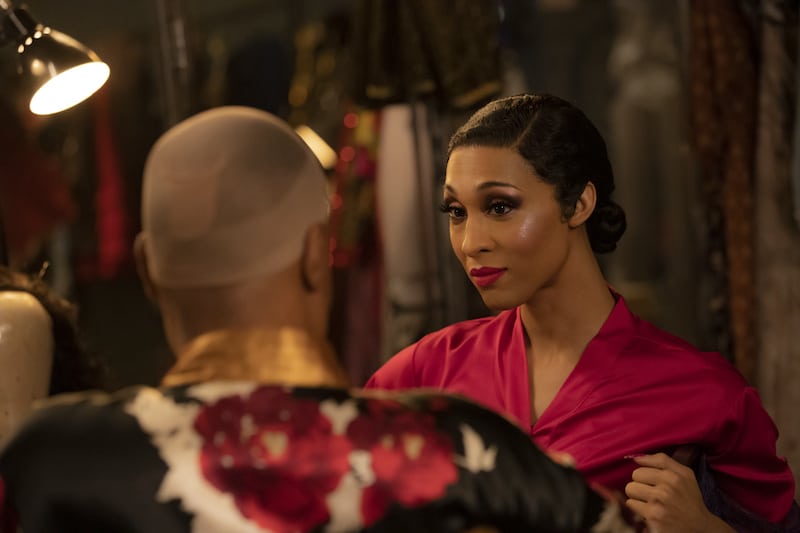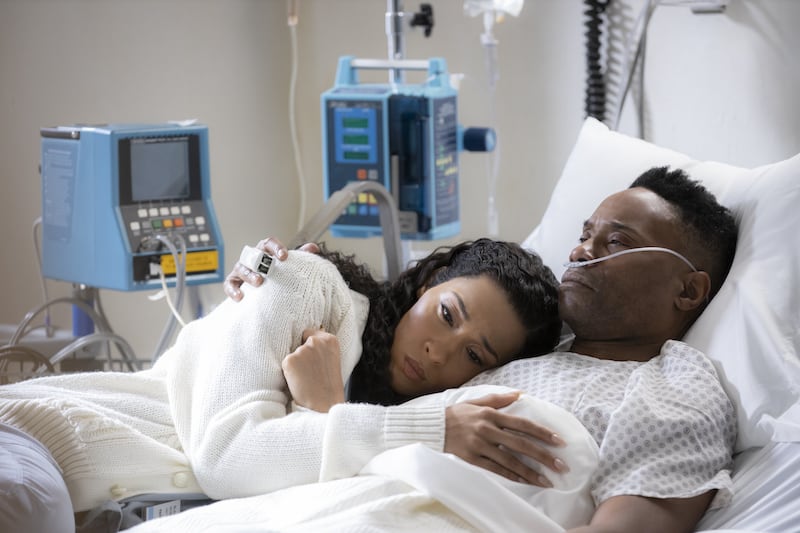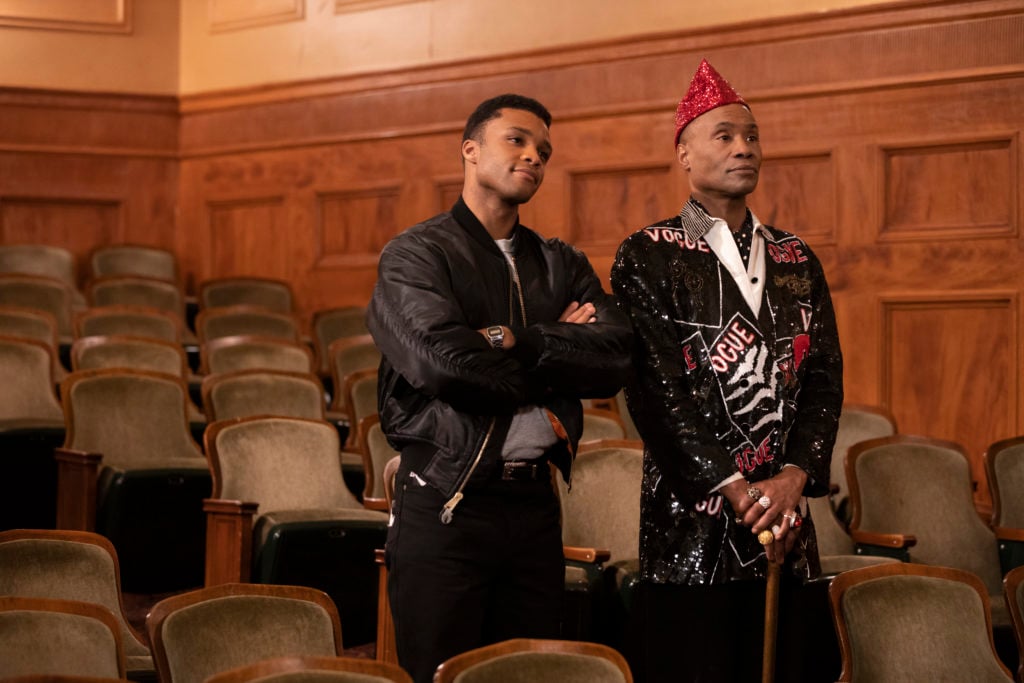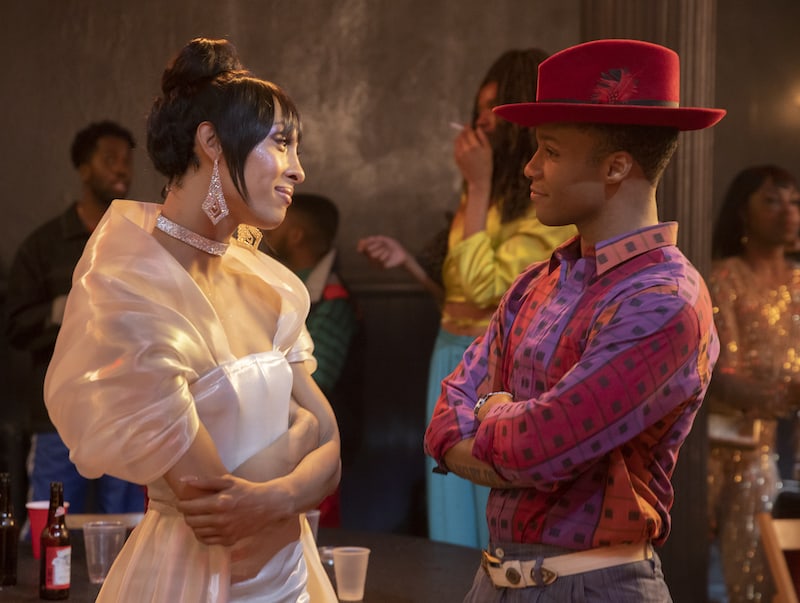
While the last few episodes of Pose have indulged in a bit of over-the-top wish fulfillment, last night's two-hour series finale placed the focus squarely back on reality. The result was a triumphant, defiant tribute to the entire queer community.
The writers had an ambitious agenda of topics and historical markers to address — drug trials, racial inequity in healthcare, ACT UP — and that's before weaving narrative threads through yet another time jump into 1998.
Like the rest of the abbreviated final season, last night's finale ripped through story beats at a dizzying pace. The first half in particular had Pray Tell at death's door to leading protests to the Mayor's door in what felt like a blink of an eye. However, if pacing was the price for so many powerful homages to queer history, it was well worth the narrative whiplash.
Maybe it's hitting different because we're still processing our most recent viral pandemic that in many ways threw the devastating mishandling of HIV/AIDS into even starker contrast. Scenes of healthcare protests and police violence have newfound resonance after the last 18 months. Or, maybe the reminder of a generation of lost friends, and the friends we never got to make, feels particularly acute during Pride month. Whatever the reason, the result is a now iconic installment of emotionally-gripping TV that begs for a rewatch.
Free from fantastically lavish weddings and organized crime syndicates, Pose was at its very best placing the extraordinary ensemble in context, honoring both story and history better than ever before.

Beginning with the advent of protease inhibitor and drug cocktails, the episode immediately confronts the racial inequality in these life-saving drug trials, with Blanca, Nurse Judy and the real Dr. McDreamy, Christopher, fighting for a spot for Pray Tell. Of course, for the 80 trial slots, only two were given to people of color. They fight with a hospital bigwig about getting a spot for Pray, but Christopher also demands one for Blanca.
The episode really highlighted the cruel chance of the virus; why Pray got so sick, but Blanca stayed mostly healthy, or why they would be lucky enough for access to these drugs, while others aren't. It brings ACT UP back into the story, but it also allows the show to make a still relevant message about healthcare disparities for communities of color. It's a lot of ground to cover quickly, including hesitancy from Blanca and Ricky that reflects the history of abuse and mistrust between black and brown people and the medical community.
The densely packed first hour kept from getting too unmoored thanks to anchoring itself in Blanca and Pray Tell's stories. In addition to weaving ACT UP's actual history into the plot, there is also an absolutely devastating homage to the San Francisco Gay Men's Chorus, inspired by the famous photograph.
When it comes to Pray's final farewell, he certainly went out with style. It feels like this whole season has been building toward his death, but a brief, promising recovery (thanks to the drug trials) was a cruel, though fair, bit of bait and switch.
In celebration of their new leases on life, Pray and Blanca's lip sync to Diana Ross's version of “Ain't No Mountain High Enough” at the ball. It is hands down one, if not the, best performance number in the show's history. There's an extra layer of sentimentality, since it's the Candy's Sweet Refrain category, and the wind and rain elements were absolute showstoppers. Even without the stunts, Mj Rodriguez and Billy Porter are radiant with their chiffongraphy. Between this scene and their season one performance of “Home,” can someone please get these two some kind of live variety revue on a streaming service ASAP?!

Of course, Pray's final acts were both in service to his community. At its heart, Pose has always been about the resilience, determination and ingenuity of the queer community, specifically the black trans community. So, it doesn't take long to piece together how Pray had been giving Ricky the lifesaving drugs he also desperately needed.
Pray's final scene, removing his makeup after the performance with Blanca, is perfect. If anyone out there is still not convinced Billy Porter must be in Emmy contention, may I suggest watching what he can do with a jar of cold cream. It's simple and beautiful and uncharacteristically restrained for this show.
Although he wasn't technically present for his final act, it did feel like something he would proudly have been a part of. Blanca took part of his ashes to the Mayor's house, a reference to the real ACT UP Ashes Actions at the White House. Already a devastating sight, hearing the cries for healthcare and witnessing the violent police response may be the series' greatest time jump of all, connecting the past so distinctly to our present.
Pray's ashes were not only destined for the mayor's doorstep. In another high-watermark scene, Pray's mother arrives at Blanca's apartment to deliver the ashes he requested be placed in lockets for loved ones. The moment they share is the ultimate tribute to Pray from the two women in his life that loved him the most.
The second half of the episode took care to resolve any last lingering threads. A time jump to 1998 shows the ladies still thriving. Elektra is somehow even richer, Lulu is a working accountant and Angel is embracing motherhood.
Blanca, however, is shining brightest of all. She's married to Christopher, she's a full nurse now and she's a patient advocate, helping HIV-positive patients get the treatment, resources and support they need. She's still doing ballroom, and there's a new generation of Evangelistas being raised by Daddy Ricky and Grandmama Blanca. Over a bougie, Sex and the City-style lunch, Blanca invites Lu, Angel and Elektra to the next ball to see the children, but they all dismiss the invite as having outgrown the scene.

It's another fake-out. At the ball, not only do Blanca and Ricky's children slay, but the original Evangelistas make an appearance to honor Blanca with official legendary status. An extremely well-earned accolade, it's the perfect bookend for a series that began with Blanca's diagnosis and determination to create her legacy. She's got new children to care for (including a recently diagnosed patient she recruits to the Evangelistas). She's offering the same sage advice Pray once offered her as she struggled to get her house off the ground. Now, she is a pillar of the community, and her legacy has long been secured.
This is not the happy ending she — nor any of us — expected, and that's what make it so much sweeter.
The legacy of Pose feels equally established. It's a vital time capsule, telling a rarely told story about some of the most incredible (and often overlooked) members of the queer community. It's a radical piece of art created by brilliant minds like Steven Canals, Janet Mock, Our Lady J and (although we may rag on him at times) Ryan Murphy. It's a love letter to a community, from that community. There has never been anything like it before, but I hope more than anything it is not the last.
Pose broke multiple boundaries in front of and behind the camera. There are so many more stories waiting to be told, and now we no longer need to wonder what's possible when people are given the opportunity to tell their own story. The only question remaining is will those in power continue to make space for these stories, and, really, will we, as audiences, refuse to accept anything less?
Furthermore, we better start seeing these actors everywhere. I mean it. This is one of the strongest ensembles ever on television, and most are just getting started in their careers. Cast them in indie features. Cast them in broad, multi-cam comedies. Put them in your streaming mumblecore dramedy. Make them Marvel superheroes! The talent here is just too immense to only be contained to this one (albeit fantastic) series.
For all its incredible history, emotionally devastating plot lines and enchanting performances, perhaps Pose‘s greatest achievement will be the stories yet to be told.
What did you think of the series finale? Tell us in the comments.



